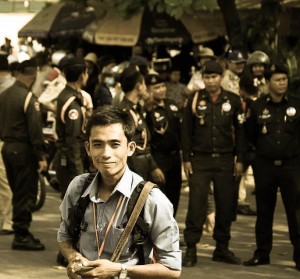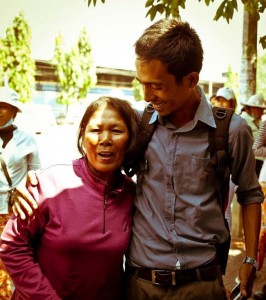Journalists@Work: Oudom Tat
 Oudom Tat, 25, is a photojournalist with Voice of Democracy (VOD), one of the few independent media outlets in Cambodia. He was first introduced to the news business at the age of 13 when he started working as a paperboy to help support his family. The Phnom Penh native then went on to teach English and eventually became a project assistant at the Cambodian Center for Independent Media. It was there he discovered his true calling.
Oudom Tat, 25, is a photojournalist with Voice of Democracy (VOD), one of the few independent media outlets in Cambodia. He was first introduced to the news business at the age of 13 when he started working as a paperboy to help support his family. The Phnom Penh native then went on to teach English and eventually became a project assistant at the Cambodian Center for Independent Media. It was there he discovered his true calling.
Oudom also produces radio stories and video pieces, and his film about the shooting of three workers in the Cambodian garment sector was selected as a finalist entry at the 2013 German Development Media Awards. These days though, Oudom is mainly doing what he loves best, taking pictures of news events around Cambodia, which he hopes will help bring about democratic change in the country. He spoke to onMedia about his work.
Why did you decide to become a journalist?
I grew up seeing plenty of problems and corruption in my society. My father always taught me about the importance of fairness and independence. But the news on television and radio in Cambodia is mostly pro-government, and “very thin,” you might say. They just broadcast stories about the prime minister inaugurating something or praise some social initiative he has backed. They never broadcast information about government crackdowns on people, such as what happened in early January this year. I decided I wanted to try to help change my society by providing real, professional-quality news to the people in Cambodia.
What did your parents and friends say about your decision?
My family was very proud. They’ve always encouraged me to do whatever I wanted to do. If you feel good about it, they said, do it. But my good friends were afraid. They know if you want to be a fair journalist, you can come up against a lot of problems. They told me I should get an office job. I thanked them for worrying about me but told them I wanted to help change my country into a real democracy. I think they understand now.
What do you like most about your job?
I love taking pictures and then writing captions for them. I like to present information to people, not telling them what to think but allowing them to make up their own minds about what’s happening in the country.
These photos by Oudom Tat were taken on Dec. 23, 2013, during a demonstration in Phnom Penh calling for a host of reforms in the country.
What do you dislike most about being a photojournalist?
I don’t like it when the government discriminates against the media. We have a lot of problems with them. Government officials don’t provide us with good information and rarely let us interview them. Journalists also face a lot of general harassment. I myself have been harassed and intimidated a lot, even threatened. When I was reporting on the problems of garment workers, I was kicked off my bike once. My bike was stolen on another occasion. I can’t be sure if the people behind it are from the government or the garment factories, but there have been problems and I’ve been told to stop doing my work or I’ll “get in trouble”. During a recent government crackdown on striking workers, I was taking pictures when someone in the military pointed a gun at me. He said: “Do you want to die for just a picture?” I stayed calm, put down my camera and stepped back to let the tension subside. But afterwards I started taking pictures again.
What was the most difficult story you have covered?
They are all hard, because it is so difficult to get information from the government. Getting an interview with a minister is the most difficult thing of all. They almost never agree to talk to independent media outlets.
 Is there a story that you have covered that has particularly affected you?
Is there a story that you have covered that has particularly affected you?
I helped produce a video on garment factory workers and during the reporting I saw first hand how much many of them have suffered. I talked to women who had fainted on the factory floor. They told me they didn’t make enough money and didn’t have enough food to eat. It really made me think about how I was fortunate compared to them. I really felt I needed to do something to help them and get their stories out.
How did you acquire your photography skills?
I never had any formal training in photography. After I got a smart phone, I realized I liked taking pictures with it. Then I realized that I knew a lot of people at work who really knew how to take good pictures. So they taught me. I just practiced and practiced until I got it.
What kind of media do you listen to/watch/read?
I follow both local and international news. I like keeping up with international developments with Reuters, CNN and the BBC. I real the local Phnom Penh Post newspaper and of course, listen to my own station, the Voice of Democracy. But as far as Cambodian TV goes, I watch something maybe once a year.
How do you feel you are developing as a journalist?
I love what I do now, since what I enjoy best is taking pictures and putting a simple but powerful caption on it. I think it’s one of the best ways to get easy-to-understand information to a large number of Cambodians. So now, I feel I’m being successful in informing my community, my country and even abroad. My aim is not to become famous and I don’t really need a lot of possessions. I would just like to do more of what I’m doing and continue to learn more about journalism and the challenges faced by my society.
Interview: Kyle James



